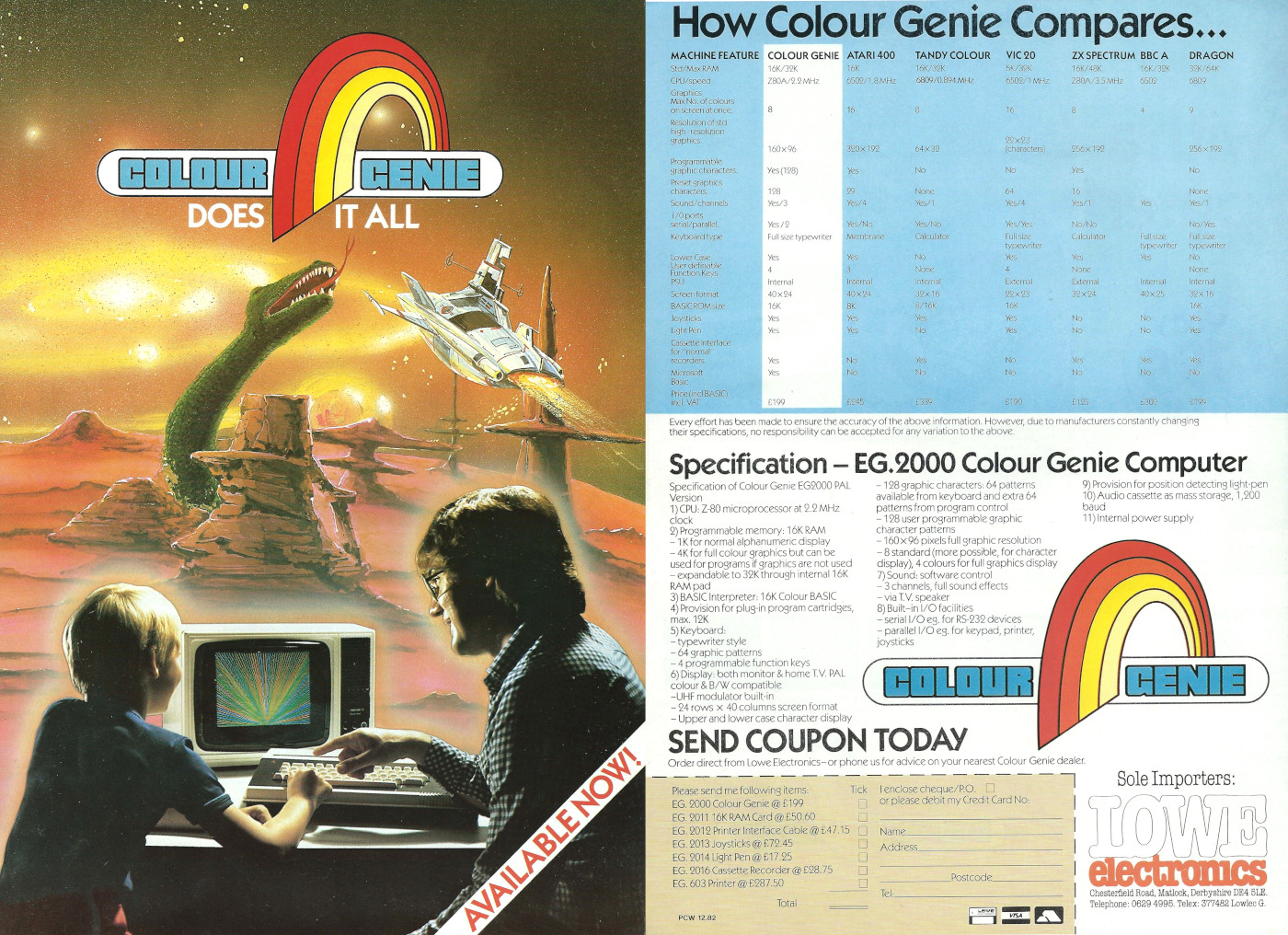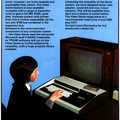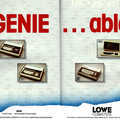EACA/Genie Advert - December 1982
From Personal Computer World

Colour Genie Does It All!
The EG2000, or Colour Genie, was released at about the same time as EACA International's update to its original 1981 monster computer, the Video Genie.
By now known as the Genie I (with built-in tape) and the Genie II (with floppy disk), EACA re-positioned these and the higher-specced Genie III as business machines, whilst the Colour Genie was aimed at the home market.
First released in Germany in August of this year, it was soon available in the UK via the same company that had been shipping the earlier models - sole distributor Lowe Electronics.
The machine was something of a puzzle to its reviewer in June 1983's Personal Computer World, with Maggie Burton saying "The extraordinary attention paid to hardware detail in this machine is tempered by some serious doubts and disadvantages". One of these appeared to be reliability, with one dealer claiming that he'd had to return 75% of his machines to Lowe.
On the other hand, the review continued that "The Genie is a machine with a lot of potential in the hands of an expert" and that "judging by the software seen on it, great things are possible"[1].
A review in September 1982's Electronics and Computing was similarly ambiguous, with Mike James writing:
"The Colour Genie is a difficult machine to come to any firm opinions about. Its competitors are many but comparing it with the most obvious - the Spectrum and the VIC - it has slight advantages over each. For example, it has a better keyboard than the Spectrum and a better display than the VIC. The real question is are the improvements significant enough to guarantee it a large chunk of the market and the answer to this depends on too many factors to come to a single conclusion. The main worry with the Colour Genie is easy to point out though - software. Previous Genies could depend on the vast range of software written for the Tandy range but the Colour Genie hasn't this option. [Lack of ] software aside, I am impressed by the features offered by the Colour Genie. The Video Genie was a success because it offered superb value for money and the Colour Genie continues this tradition[2]".
EACA had previously made its machines compatible with the TRS-80 Model 1, a computer that had been first launched in 1977, but it broke with that tradition for the Colour Genie, even though the machine had the same Z80 processor in it.
Prototype Colour Genies - also known as the Genie IV - couldn't even read tape from previous models, although Lowe suggested in September 1982 that EACA was considering changing this[3].
The Colour Genie retailed for £199, or about £850 in 2024 money, which put it head-to-head with machines like Commodore's VIC-20 or the Dragon 32, although it beat the VIC with 16K memory.
Somewhat disingeneously, the advert compares BASICs and states that whilst the Colour Genie has Microsoft BASIC, the VIC 20 does not. Actually, Commodore's BASIC was based closely upon Microsoft's - it was still using the same licenced version that it had purchased to put on the Commodore PET of 1977, with some modifications.
Commodore's particular agreement meant that it didn't have to show any MS copyright - an arrangement that only lapsed when it had to re-negotiate for a 16-bit BASIC to go on the Amiga range in 1985.
EACA was a somewhat mysterious and enigmatic company, with Personal Computer World saying "nobody seems to know much about EACA International except that it is in Hong Kong"[4]. The company's founder legged it to Taiwan after the company went bust at the end of 1983[5].
Sources
Text and otherwise-uncredited photos © nosher.net 2024. Dollar/GBP conversions, where used, assume $1.50 to £1. "Now" prices are calculated dynamically using average RPI per year.


